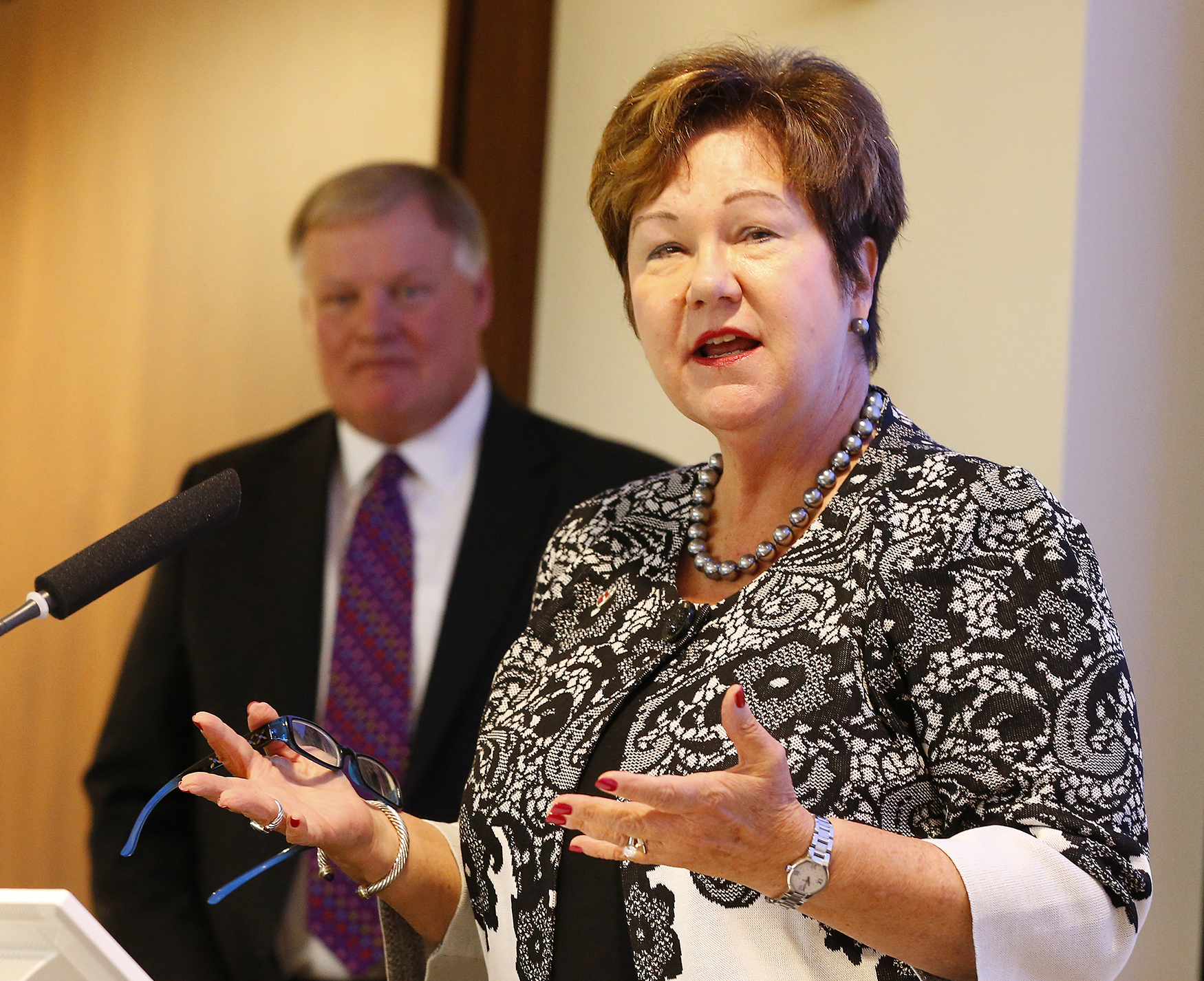
Dr. Juliann G. Sebastian speaks at the grand opening of the UNMC Health Science Education Complex on the campus of the University of Nebraska at Kearney. Dr. Sebastian chairs the Wellbeing Council.
Below is a column written by Dr. Juliann G. Sebastian:
Many thanks to Assistant Vice Chancellor for Campus Wellness at UNMC and UNO, Dr. Steve Wengel, for inviting me to share some thoughts with you in his inaugural Wellness Newsletter! As chair of the UNMC Wellbeing Coordinating Council, I am delighted to tell you about the vision and work of this group and to encourage anyone who would like to join to please contact me. This group, currently composed of 39 members from every facet of UNMC, and from Nebraska Medicine, UNO, and Clarkson College, meets monthly to foster a culture of wellbeing and to link with groups where our work overlaps in powerful and important ways. We aim to support and complement Dr. Wengel’s work with our joint goals of creating and supporting strategic initiatives to expand wellbeing and wellness throughout our 500 mile-wide campus. The vision of the Wellbeing Coordinating Council is that UNMC will be the national leader among academic health science centers in wellness.
We began informally in 2015 as several of us started planning what became an annual Wellbeing Symposium, generously supported by Chancellor Gold. To date, we have held three symposia and are planning our fourth for Feb. 15, 2019. As time went on, individuals from each college, Nebraska Medicine, the UNMC Faculty Senate and Student Senate, the UNO Wellness Council, and from various staff offices, joined the group. The growth of this voluntary, interprofessional and interdisciplinary group shows how much interest is present in wellbeing and wellness. Interestingly, when we have spoken with leaders who have come in from other locations throughout the nation, they usually comment on how important commitment from leadership is to the success of these efforts. I am proud to say that Chancellor Gold supports this completely and is the person who launched the campus-wide effort, and the vice-chancellors, deans, and directors likewise are completely supportive. Reorienting a culture that is hard-charging, driven to excellence, and hungry for transformations toward one that supports these same attributes but within a cohesive net of social support and meaningful organizational supports for wellness takes a team. This work fits perfectly within the iTEACH values, of innovation, teamwork, excellence, accountability, courage, and healing.
The theme for the 2019 Wellbeing Symposium is “The Ecology of Wellbeing”. Please mark your calendars for Friday, Feb. 15, 2019. The Symposium will be held at the Scott Conference Center and faculty, staff, students, clinicians, and alumni from UNMC, UNO, Nebraska Medicine, and Clarkson College are all invited. For the first time this year, we will market the symposium regionally and nationally, with the goal of expanding the national conversations on this vital work. We are partnering with UNO by planning this symposium the day before their TEDx UNO, scheduled for Sat., Feb. 16, 2019, with the theme of “Resilience”.
I think every unit within the UNMC UNePlan has at least one initiative aimed at wellbeing. Increasingly, we are going beyond only focusing on what we can do for ourselves as individuals (although that is important, of course!), and addressing how we as an organization can evaluate our culture, policies, system of rewards, and expectations to support wellbeing. A huge amount of great work is already being done, from the Center for Healthy Living, to the work that Dr. Wengel and Dr. Sikorski are doing, to various initiatives in each college to support students. The university’s focus on inclusivity is a major contributor to wellbeing as is the growing Healing Arts program and the HR benefits that are available to us, such as Arbor Family Counseling and vacation policies just to name two. The work UNO is doing with the Medical Humanities also fits into this overall culture and work of supporting wellbeing.
For example, in the College of Nursing, Steve Langan, the Interim Director and Community Liaison for Medical Humanities from UNO, was kind enough to lead us through a poetry-writing session during our Annual Meeting in May. Steve founded the Seven Doctors Project at UNMC in 2008. He expertly guided faculty and staff across all five campuses through sharing of themselves through poetry that many of us thought we could not write. “I commend College of Nursing faculty and staff for being willing to be apprentices and to have some fun by creating and sharing an original composition,” Steve Langan said. “I continue to witness the impact of the humanities, arts, and social sciences, particularly for students and colleagues who are on a healthcare track.”
Medical humanities provides one lens for exploring meaning in the work we do and reminding us of the compassion and dedication we bring to this work. Opportunities in the medical humanities also help reduce the “compassion fatigue”[i] that can be part of our important work as health professionals.
Please let us know if you would like to be part of the UNMC Wellbeing Coordinating Council and please join your college, institute, clinical unit, department, etc. in the many life-enhancing opportunities that are part of a culture of wellbeing! Our goals are to support one another, prevent feelings of isolation and burnout, and foster joy in our work together.
Sorenson, C., Bolick, B., Wright, K. & Hamilton, R. (2017). An evolutionary concept analysis of compassion fatigue. Journal of Nursing Scholarship, 49, 557-563. doi:10.1111/jnu.1231Sorenson, C., Bolick, B., Wright, K. & Hamilton, R. (2017). An evolutionary concept analysis of compassion fatigue. Journal of Nursing Scholarship, 49, 557-563. doi:10.1111/jnu.12312.